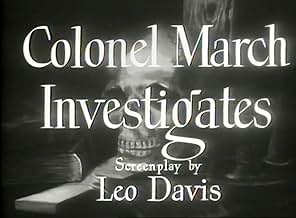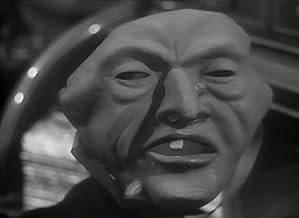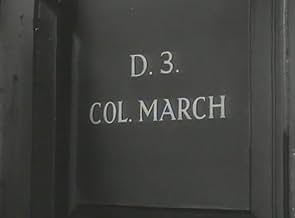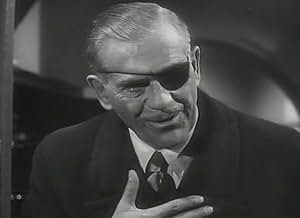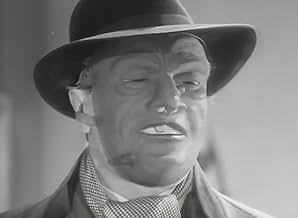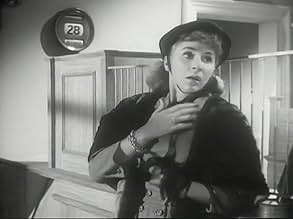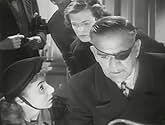IMDb RATING
5.9/10
189
YOUR RATING
Three episodes of "Colonel March of Scotland Yard" edited together for theatrical release.Three episodes of "Colonel March of Scotland Yard" edited together for theatrical release.Three episodes of "Colonel March of Scotland Yard" edited together for theatrical release.
Patricia Owens
- Betty Hartley
- (archive footage)
Dana Wynter
- Francine Rapport
- (as Dagmar Wynter)
Peter Butterworth
- Bank clerk
- (uncredited)
Cy Endfield
- Man leaving British Museum library
- (uncredited)
Pat Hagan
- Police Constable at Bank
- (uncredited)
Victor Harrington
- Customer in Bank
- (uncredited)
- Director
- Writers
- All cast & crew
- Production, box office & more at IMDbPro
Featured reviews
Boris Karloff in the persona of the eyed-patched, erudite March, offers three mysteries from his office in Scotland Yard, the Bureau of Queer Complaints.
It's three episodes of what would become Colonel March of Scotland Yard, shot as pilots for the prospective series, and then strung together for theatrical release. The BBC was distinctly uninterested, until ITV was approved, whereupon the powers there decided they needed something to compete with the awful thing, whereupon they commissioned twenty-six episodes. Karloff is charming and intelligent, aspects he was rarely called upon to present in the movies, although they showed up in some of his television appearances. Stardom is just as confining as the typecasting of supporting players, and while Karloff the Object of Terror was something that could be sold to movie audiences based on his corpus of work, performances such as this would have confused them. It's a pity, because with the death of C. Aubrey Smith in 1948, this shows that Karloff could have taken over the role of the gruff but kindly, aristocratic exemplar of the Empire. But why pay the premium that Karloff commanded as a horror icon, only to confuse and upset the moviegoer?
It's three episodes of what would become Colonel March of Scotland Yard, shot as pilots for the prospective series, and then strung together for theatrical release. The BBC was distinctly uninterested, until ITV was approved, whereupon the powers there decided they needed something to compete with the awful thing, whereupon they commissioned twenty-six episodes. Karloff is charming and intelligent, aspects he was rarely called upon to present in the movies, although they showed up in some of his television appearances. Stardom is just as confining as the typecasting of supporting players, and while Karloff the Object of Terror was something that could be sold to movie audiences based on his corpus of work, performances such as this would have confused them. It's a pity, because with the death of C. Aubrey Smith in 1948, this shows that Karloff could have taken over the role of the gruff but kindly, aristocratic exemplar of the Empire. But why pay the premium that Karloff commanded as a horror icon, only to confuse and upset the moviegoer?
Blacklisted Hollywood director Cy Endfield was given sanctuary at Nettlefold Studos in the early fifties by producer Hannah Weinstein directing these three pilot episodes for a TV series cobbled together into a rather hectic feature film starring a dashing-looking Boris Karloff sporting an eyepatch as he stumbled across a succession of bizarre crimes as John Dickson Carr's Colonel March of Scotland Yard.
(Years later, two of the cast, John Hewer and Sheila Burrell, became famous in add campaigns; John Hewer (now bearded) as Captain Birdseye and Sheila Burrell as the little old lady dismayed to discover her local bank is now "a trendy wine bar".)
(Years later, two of the cast, John Hewer and Sheila Burrell, became famous in add campaigns; John Hewer (now bearded) as Captain Birdseye and Sheila Burrell as the little old lady dismayed to discover her local bank is now "a trendy wine bar".)
The master of the locked room mystery was, unarguably, John Dickson Carr, one of the most popular crime writers of the Golden Age. His masterpiece, The Hollow Man (1935), retains an almost legendary status among crime fiction fans, but he is now sadly forgotten by the wider public. The books have long been out of print in this country and I'm always hoping that some publisher will bring them back. Perhaps they are so obscure because Carr's most famous sleuths, Dr Gideon Fell and Sir Henry Merrivale, never made it to the screen. One of his lesser characters managed it, however, in the early 1950s, with the television series Colonel March of Scotland Yard.
Carr had used the character only once in his 1940 short story collection The Department of Queer Complaints, in which there is a subdivision of Scotland Yard that specialises in crimes of a curious or apparently impossible nature. The series was financed by the Americans and starred international film star Boris Karloff - most famous for playing the Chinese-American detective Mr Wong and, of course, Frankenstein's Monster. At this point in his long career, Karloff was a frequent guest on American radio series and even had his own show for children in which he read stories and told riddles. In 1952, he returned to England and made three episodes for ITV which acted as pilots for a longer series. Eventually, twenty six were produced, all of which were a brisk 25 minutes long.
The first three made were stitched together for release to cinemas in 1953. This was not uncommon for a TV show at the time and the practice would continue into the next decade, particularly with The Saint. Colonel March Investigates, then, is a taut 70 minute anthology of three slight, though entertaining, mysteries with the twinkly-eyed Karloff. He gives the character an eye-patch, which he didn't have in the stories, but it adds something to the character, as we can imagine he may have lost it in the First World War. This, perhaps, is someone who has witnessed untold horrors and has come to terms with the world by engaging with its more whimsical wonders.
Unsurprisingly, there is a framing device which helps tie the three tales together, in which March stands in his office and inspects a cupboard stocked with souvenirs of his cases before leading the audience into the corresponding story.
The first of these, aired as 'Hot Money', revolves around a bank robbery in which a clerk is incriminated. He follows the criminal to an office, where the money is seemingly stored. However, when the place is searched, the money has apparently disappeared. Despite the clerk being framed in the silliest of ways, the resolution is pretty decent, but nothing too special. Joan Sims appears here in an early role, and March reveals a John Steed-like umbrella sword!
The second story was aired as 'Death in the Dressing Room', which is probably the weakest of the three. Set in a nightclub, it features an exotic dance routine which acts as a clue, while the always reliable Richard Wattis plays the manager. The running time to these is so short that there is virtually no time to set up a number of suspects, so the culprit tends to be the person who has been in it the most. No matter, as it's all about how March gets his man, which he does here in a tense confrontation. As usual, March's sparring partner is the Scottish Inspector Ames (Ewan Roberts), though you wonder why he's there as March seems to be a famous genius.
The third story, intriguingly titled 'The New Invisible Man', features a peeping tom who has apparently witnessed a pair of animated gloves committing murder, and a scene of a crime with no evidence of a crime. It's the best one, I think, though there are a couple of problems. We get the opportunity to see the gloves in action ourselves, but it doesn't look much like the way it's shown to us in the reveal. The trick is good, nonetheless, and it certainly had me baffled. The reason behind it all is pretty shaky, however, and involves stolen paintings and, eventually, a kidnapped March. It's all good fun, though, which is what I'd call the film as a whole. And an interesting peek, as ever, into bygone England. It's just a pity the complete series isn't available.
Carr had used the character only once in his 1940 short story collection The Department of Queer Complaints, in which there is a subdivision of Scotland Yard that specialises in crimes of a curious or apparently impossible nature. The series was financed by the Americans and starred international film star Boris Karloff - most famous for playing the Chinese-American detective Mr Wong and, of course, Frankenstein's Monster. At this point in his long career, Karloff was a frequent guest on American radio series and even had his own show for children in which he read stories and told riddles. In 1952, he returned to England and made three episodes for ITV which acted as pilots for a longer series. Eventually, twenty six were produced, all of which were a brisk 25 minutes long.
The first three made were stitched together for release to cinemas in 1953. This was not uncommon for a TV show at the time and the practice would continue into the next decade, particularly with The Saint. Colonel March Investigates, then, is a taut 70 minute anthology of three slight, though entertaining, mysteries with the twinkly-eyed Karloff. He gives the character an eye-patch, which he didn't have in the stories, but it adds something to the character, as we can imagine he may have lost it in the First World War. This, perhaps, is someone who has witnessed untold horrors and has come to terms with the world by engaging with its more whimsical wonders.
Unsurprisingly, there is a framing device which helps tie the three tales together, in which March stands in his office and inspects a cupboard stocked with souvenirs of his cases before leading the audience into the corresponding story.
The first of these, aired as 'Hot Money', revolves around a bank robbery in which a clerk is incriminated. He follows the criminal to an office, where the money is seemingly stored. However, when the place is searched, the money has apparently disappeared. Despite the clerk being framed in the silliest of ways, the resolution is pretty decent, but nothing too special. Joan Sims appears here in an early role, and March reveals a John Steed-like umbrella sword!
The second story was aired as 'Death in the Dressing Room', which is probably the weakest of the three. Set in a nightclub, it features an exotic dance routine which acts as a clue, while the always reliable Richard Wattis plays the manager. The running time to these is so short that there is virtually no time to set up a number of suspects, so the culprit tends to be the person who has been in it the most. No matter, as it's all about how March gets his man, which he does here in a tense confrontation. As usual, March's sparring partner is the Scottish Inspector Ames (Ewan Roberts), though you wonder why he's there as March seems to be a famous genius.
The third story, intriguingly titled 'The New Invisible Man', features a peeping tom who has apparently witnessed a pair of animated gloves committing murder, and a scene of a crime with no evidence of a crime. It's the best one, I think, though there are a couple of problems. We get the opportunity to see the gloves in action ourselves, but it doesn't look much like the way it's shown to us in the reveal. The trick is good, nonetheless, and it certainly had me baffled. The reason behind it all is pretty shaky, however, and involves stolen paintings and, eventually, a kidnapped March. It's all good fun, though, which is what I'd call the film as a whole. And an interesting peek, as ever, into bygone England. It's just a pity the complete series isn't available.
Colonel March investigates three cases, the first a bank robbery, in which a mask wearing gunman gets away with a haul of cash, killing someone in the process.
In the second case, March is at night club where a Javanese dancer killed, and in the third March deals with a man who's convinced he's witnessed a murder through his binoculars.
Boris Karloff is great as Colonel March, an eye patch wearing, straight talking Detective, who often talks directly to the camera.
March establishes exactly what happens as 'The Department for Queer complaints,' he deals with some of the more unusual crimes, locked room mysteries as it were.
Some years ago, I worked my way through Thr Colonel March series, and for its time, I always felt it was somewhat ahead of its time, it really has that feeling of a 1950's American TV series, but of course it's set in The UK, with a largely British cast.
The three cases flow fairly well together, it doesn't feel cobbled together at any point. If you can access the TV series, I'd recommend it, as a few of the cases are very interesting.
Watch out for several well known faces, you'll see Ronald Leigh Hunt, Joan Sims, Richard Wattis, Sheila Burrell and more.
It's definitely worth a look.
7/10.
In the second case, March is at night club where a Javanese dancer killed, and in the third March deals with a man who's convinced he's witnessed a murder through his binoculars.
Boris Karloff is great as Colonel March, an eye patch wearing, straight talking Detective, who often talks directly to the camera.
March establishes exactly what happens as 'The Department for Queer complaints,' he deals with some of the more unusual crimes, locked room mysteries as it were.
Some years ago, I worked my way through Thr Colonel March series, and for its time, I always felt it was somewhat ahead of its time, it really has that feeling of a 1950's American TV series, but of course it's set in The UK, with a largely British cast.
The three cases flow fairly well together, it doesn't feel cobbled together at any point. If you can access the TV series, I'd recommend it, as a few of the cases are very interesting.
Watch out for several well known faces, you'll see Ronald Leigh Hunt, Joan Sims, Richard Wattis, Sheila Burrell and more.
It's definitely worth a look.
7/10.
American-financed but shot in London, COLONEL MARCH OF Scotland YARD was a short-lived 1950s-era TV series starring Boris Karloff as a detective in charge of Department 3 at Scotland Yard - a department commonly nicknamed 'The Department of Queer Complaints'. It's a period-era X-FILES, with Karloff investigating various supernaturally-tinged crimes.
This film version is an anthology of three episodes from the show, all of them featuring a typically imposing Karloff as the eyepatch-sporting hero. It's always great to see the genial Karloff playing the hero for a change, and his gruff charm adds immeasurably to the pleasure of this otherwise rather ordinary little anthology. My main disappointment with COLONEL MARCH INVESTIGATES is that the supernatural stuff is kept distinctly limited in favour of the more ordinary explanation.
The first story, HOT MONEY, is about a bank robbery in which the loot vanishes; it's short and snappy, and worth seeing for Joan Sims, impossibly young and playing a lawyer's secretary. The second story, DEATH IN THE DRESSING ROOM, has some fun in the form of exotic dance and the atmospheric nightclub scenes, and features the lovely Dana Wynter alongside an on-form Richard Wattis, cast against type. The third story, THE NEW INVISIBLE MAN, sounds great but is in fact the least, a simple tale with a simple twist. Still, these are great fun for the era, and it's worth seeing for Karloff alone.
This film version is an anthology of three episodes from the show, all of them featuring a typically imposing Karloff as the eyepatch-sporting hero. It's always great to see the genial Karloff playing the hero for a change, and his gruff charm adds immeasurably to the pleasure of this otherwise rather ordinary little anthology. My main disappointment with COLONEL MARCH INVESTIGATES is that the supernatural stuff is kept distinctly limited in favour of the more ordinary explanation.
The first story, HOT MONEY, is about a bank robbery in which the loot vanishes; it's short and snappy, and worth seeing for Joan Sims, impossibly young and playing a lawyer's secretary. The second story, DEATH IN THE DRESSING ROOM, has some fun in the form of exotic dance and the atmospheric nightclub scenes, and features the lovely Dana Wynter alongside an on-form Richard Wattis, cast against type. The third story, THE NEW INVISIBLE MAN, sounds great but is in fact the least, a simple tale with a simple twist. Still, these are great fun for the era, and it's worth seeing for Karloff alone.
Did you know
- TriviaA pilot comprising three stories which would become episodes of the TV series 'Colonel March of Scotland Yard', filmed in the Autumn of 1952 at Nettlefold Studios: "Hot Money (1956)," "Death in the Dressing Room (1956)," and "The New Invisible Man (1956)."
- GoofsIn the final segment, 'The New Invisible Man', Major Rodman is kept in the police station. It is not clear who, therefore, has lit the fire in his sitting room, and kept it blazing all day.
- Quotes
Insp. Ames: The radiator! Now why didn't I think of that?
Col. March: My dear Ames. Please don't embarrass us both by forcing me to answer that question.
- Crazy creditsOpening credits prologue: LONDON
- ConnectionsEdited from Les aventures du Colonel March (1954)
Details
- Release date
- Country of origin
- Language
- Also known as
- Colonel March Investigates
- Filming locations
- 140 Kings Road, Chelsea, London, England, UK(exterior Barclays Bank)
- Production company
- See more company credits at IMDbPro
- Runtime
- 1h 10m(70 min)
- Color
- Aspect ratio
- 1.37 : 1
Contribute to this page
Suggest an edit or add missing content

